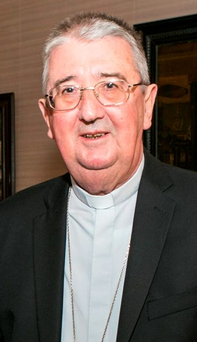Church Must Build Trust with Openness
Irish Independent
Saint Patrick's Seminary in Maynooth is not to be condemned, but it is not to be canonised either, according to Archbishop Diarmuid Martin, speaking on RTE. If this was an endorsement, it was less than whole-hearted. He also said that the seminary would have to change not just because of allegations, but because we are "living in a different world". After bishops admitted to having concerns at the "unhealthy atmosphere" at the seminary, Archbishop Martin tried to draw a line under the controversy. Unfortunately, his comments are unlikely to put matters to rest. The church has endured a relentless barrage of criticism for elevating its interests and reputation above the needs of its followers. It has been charged with being aloof, arrogant and out of step. It has further been attacked for failing to confront weaknesses and for retreating into its shell. It therefore has a responsibility to be open and transparent. Maynooth's board of trustees have said they will review social media policies and procedures for handling whistleblowers following allegations of trainee priests using dating apps. This came after Dr Martin's stated intention to send seminarians from his archdiocese to Rome, instead of the national seminary, due to his worries over "strange goings-on" in St Patrick's. He cut a lonely figure when he first voiced his concerns, the silence from other bishops was deafening. So has there finally been a meeting of minds on Maynooth? He feels that new times require new institutions. The sad truth is that some of these "institutions" have failed in their responsibilities. They have become associated with secrecy and power. What is required is new trust, and new openness. Referring to the bishops' statement, Dr Martin said: "It's an announcement, but it has to be followed and implemented as you go along . . ." Traditionally, the church had "shepherds and a flock". What many feel is missing is a meaningful and shared sense of inclusivity and direction. Lost for words when it comes to plain speaking For far too long in the quest for clarity, the battle between man and gibberish has been lost to officialdom. Law, medicine, the civil service, the worlds of finance and governance all fight to the death to render every syllable devoid of meaning to shield themselves from responsibility, and shroud the public in a fog of bewilderment. But help is at hand in the name of plain-speaking simpler language and common understanding. The National Adult Literacy Agency (NALA) is declaring war on nonsense to simplify and clarify documents through its 2016 Plain English Awards. More than 60 years ago, British civil servant Sir Ernest Gowers fired the first salvo to restore sanity to official language. When he launched his 'Plain Words' book in 1948, his iron rule was: "Be short, be simple and be human." Of course, it is an uphill struggle. Metaphors are mangled with abandon. In the UK, there was Nick Clegg's celebrated: "You cannot balance the books on the backs of the poor." All those who have had their heads melted with words like 'modalities', 'restructuring', 'rightsizing', 'brain-storming' and 'blue-sky thinking' may breathe again. It is to be hoped that the need to inform will once more take precedence over the need to impress. But the necessity of avoiding ambiguity, to be clear and concise, can not be overstated. If you doubt it, consider this gem of advice from the UK Department of Health to young mothers: "If a baby does not thrive on raw milk, boil it."
|
.
Any original material on these pages is copyright © BishopAccountability.org 2004. Reproduce freely with attribution.
